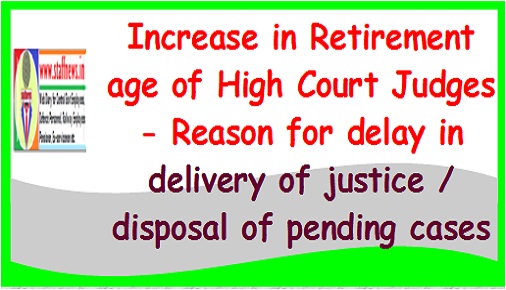Increase in Retirement age of High Court Judges – Reason for delay in delivery of justice / disposal of pending cases
GOVERNMENT OF INDIA
MINISTRY OF LAW & JUSTICE
DEPARTMENT OF JUSTICE
RAJYA SABHA
UNSTARRED QUESTION NO. 3445
TO BE ANSWERED ON THURSDAY, THE 25 TH MARCH, 2021
INCREASE IN RETIREMENT AGE OF HIGH COURT JUDGES
3445. SHRI P. WILSON:
Will the Minister of LAW AND JUSTICE be pleased to state:
(a) whether it is a fact that acute shortage of judges in various courts of the country is the main reason for delay in delivery of justice / disposal of pending cases in the country;
(b) if so, the details of the corrective measures taken/being taken by Government to fill the vacancies to address the shortage of judges; and
(c) whether Government has any plan to increase the retirement age of High Court judges to 65 years in the country, if so the details thereof?
ANSWER
MINISTER OF LAW AND JUSTICE, COMMUNICATIONS AND
ELECTRONICS & INFORMATION TECHNOLOGY
(SHRI RAVI SHANKAR PRASAD)
(a) & (b): Disposal of pending cases in courts is within the domain of Judiciary. No time frame has been prescribed for disposal of various kinds of cases by the respective courts. Government has no role in disposal of cases in courts. Timely disposal of cases in courts depends on several factors which, inter-alia, include availability of adequate number of judges, supporting court staff and physical infrastructure, complexity of facts involved, nature of evidence, co-operation of stake holders viz. bar, investigation agencies, witnesses and litigants and proper application of rules and procedures. The Government is, however, fully committed to speedy disposal of cases. The Government has taken several initiatives to provide an ecosystem for faster disposal of cases by the judiciary. The National Mission for Justice Delivery and Legal Reforms established by the Government has adopted a coordinated approach for phased liquidation of arrears and pendency in judicial administration through various strategic initiatives, including improving infrastructure for courts, leveraging Information and Communication Technology for better justice delivery, and filling up of vacant positions of Judges in High Courts and Supreme Court.
The appointment of Judges of the Supreme Court and High Courts are done under Article 124, 217 and 224 of the Constitution respectively. As per procedure prescribed in the Memorandum of Procedure (MoP) for appointment of Judges in the Higher Judiciary, prepared in 1998 pursuant to the Supreme Court Judgement of October 6, 1993(Second Judges case) read with their Advisory Opinion of October 28, 1998 (Third Judges case), the initiation of proposal for appointment of Judges in the Supreme Court vests with the Chief Justice of India, while initiation of proposal for appointment of Judges in the High Courts vests with the Chief Justice of the High Court concerned. The matters relating to sanctioned strength and filling up of the vacancies of judges / judicial officers in District and Subordinate courts fall within the domain of State Governments and the High Courts.
The Central Government has been taking up the matter of increasing the sanctioned strength of judges / judicial officers and filling up of vacancies in District and Subordinate Courts with the State Governments and the High Courts from time to time. Supreme Court is monitoring the recruitment of Subordinate Judiciary in the case of Malik Mazhar Sultan & Another versus U.P. Public Service Commission & Others.
Filling up of vacancies in the High Courts is a continuous, integrated and collaborative process between the Executive and the Judiciary. It requires consultation and approval from various Constitutional Authorities both at state and centre level. While every effort is made to fill up the existing vacancies expeditiously, vacancies of Judges in High Courts do keep on arising on account of retirement, resignation or elevation of Judges and also due to increase in the strength of Judges.
(c): There is no proposal at present to increase the retirement age of High Court judges.


COMMENTS